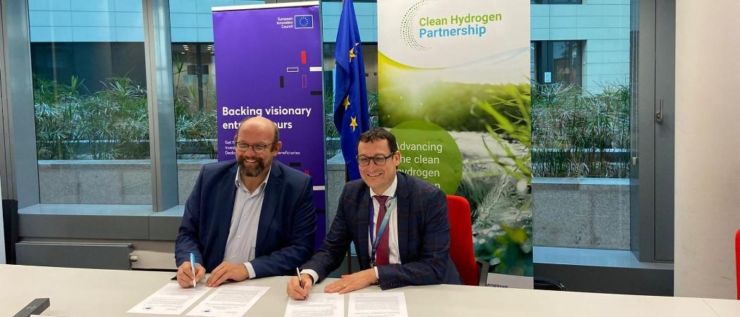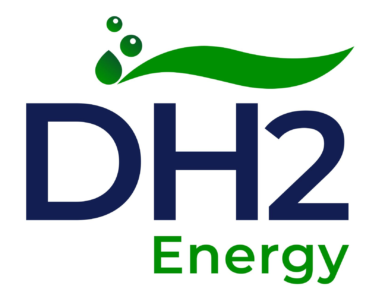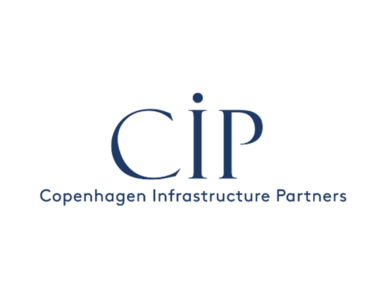Clean Hydrogen Partnership and European Innovation Council join forces to help renewable hydrogen companies scale-up.
The partnership aims to streamline EU funding and encourage data sharing to give a much-needed boost to clean hydrogen.
The Clean Hydrogen Joint Undertaking (JU) and the European Innovation Council and SMEs executive agency (EISMEA) have signed an agreement to help renewable hydrogen companies scale up and boost the development of an EU low carbon economy.
Bart Biebuyck, executive director of Clean Hydrogen JU, said:
🔥 What about we co-host a webinar? Let's educate, captivate, and convert the hydrogen economy!
Hydrogen Central is the global go-to online magazine for the hydrogen economy, we can help you host impactful webinars that become a global reference on your topic and are an evergreen source of leads. Click here to request more details
One of the main challenges of building a clean hydrogen economy is the scaling up.
“There are a lot of SMEs in the hydrogen sector, and the main aim of this collaboration is to help them scale up.”
Clean hydrogen, produced by using electricity from renewable sources to produce hydrogen by splitting water, can be used as a feedstock, a fuel or energy carrier, or storage medium. The EU is betting on it as a key plank in achieving net zero carbon emissions – and more recently to reduce dependence on Russian energy.
To move things forward the EU has launched various strategies, such as the Clean Hydrogen Strategy and RepowerEU, to smooth the transition to a low carbon economy.
The joint undertaking backs research activity into hydrogen production, distribution, storage and commercial rollout. Meanwhile, the EIC has a portfolio of projects from early stage to more mature phases, working innovative hy drogen-based technologies that need to scale-up and get to market.
As things stand, the market is still, “in its infancy,” said Jean-David Malo, director of EISMEA, and it is more expensive to produce greenhydrogen than generating it from natural gas or methane. Compounding the challenge of scaling up, many companies in the sector are SMEs. In the JU, they account for 30% of the beneficiaries. For the sector to grow, SMEs need to grow.
Jean-David Malo, director of EISMEA, said:
The partnership between the JU and EISMEA aims to guide SMEs, to all the existing EU funding support concerning hydrogen-related activities.
For instance, projects funded by the JU might take advantage of scale-up activities under the EIC. At the same time, early stage research projects funded by the EIC could deploy the results in real environments through the JU, he added.
“The cooperation will create a larger and more diverse European ecosystem on hydrogen than any of the two programmes can do alone,” Malo said.
The EU effort to promote clean hydrogen involves a number of initiatives. In September the Commission approved €5.2 billion in state aid for the Hy2Use project, involving 35 projects and companies in Europe aiming to develop infrastructure for the production, storage and transport of hydrogen, and for hydrogen applications for energy-intensive industries.
A similar €5.4 billion project in the hydrrogen value chain, Hy2Tech, was approved in July.
Building synergies
The collaboration between the hydrogen JU and EIC is aimed at building synergies between their activities to get more coherent results and avoid duplication, by increasing information exchange on funds and grants, aligning funding opportunities for hydrogen projects and sharing the data they generate.
Information sharing will for instance involve TRUST, a JU tool which gathers data on key performance indicators, where EIC will now be able to include information EIC-related grants.
“It is important that at the European level we make sure that all the learnings are gathered together and that we all know how the technology progresses,” said Biebuyck.
“At the same time, it’s crucial to build synergies as well, so that if two companies are working on two ‘exotic’ projects, maybe they can join forces and work together. In this way, we give all the new technologies a chance to grow,” he said.
Besides scaling up the infrastructure, other challenges hamper the growth of the clean hydrogen sector. One of them, said Biebuyck, is getting a sufficient supply of electricity from renewable sources “We are very much depending on the whole sector on how fast that will happen,” he said.
READ the latest news shaping the hydrogen market at Hydrogen Central
Clean hydrogen group and European Innovation Council join forces to help renewable hydrogen companies scale-up, November 29, 2022








